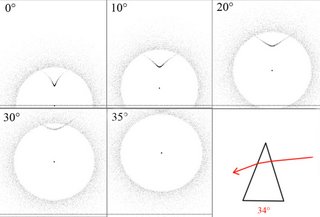Moilanen arc behaviour
 We have now enough photographs of Moilanen arc to make some suppositions of the responsible crystal. As lower component of Moilanen arc does not seem to exist, the crystal must be well oriented. Straight upwards pointing wedge with ~ 34° angle seems to produce an arc that fits well with photographed cases both in shape and location.
We have now enough photographs of Moilanen arc to make some suppositions of the responsible crystal. As lower component of Moilanen arc does not seem to exist, the crystal must be well oriented. Straight upwards pointing wedge with ~ 34° angle seems to produce an arc that fits well with photographed cases both in shape and location.In the image above are given simulations of Moilanen arc and 22° halo for solar elevation range of 0-35°. Also the Moilanen arc raypath through the wedge is shown. At 35° light source elevation the Moilanen arc is already disappearing and shows weakly above the 22° halo.
In free fall the depicted simple prism would hardly orient as shown. What kind of crystal causes Moilanen arc is still a mystery. Altough Finnish observers have managed to sample crystals from a couple of Moilanen arc displays this winter, the crystal photos have not resulted in a breakthrough.
These images are no news to those who have an inclination to fiddle with halo simulation programs. But as nobody has given them anywhere, I thought they might be of some help for the halo community in knowing what to expect when the next diamond dust swarms in. Simulations are made with software by Mika Sillanpää and Jarmo Moilanen.

8 Comments:
Another challenge when trying to simulate this arc is to find a crystal with a wedge angle of 34° that does not produce other spurious arcs. A failure for an otherwise semi-credible crystal is shown here!
Les
I wonder if twinned crystals could form the arc. I just hope the next time there is a display with the arc that is bright and well formed that a crystal sample gets collected.
The crystal can be something out of this world. I mean, Moilanen arc was seen also in the Lascar display, that had no prismatic crystals. The other arcs in the displays were kinda poorly defined, but Moilanen was as usual, well defined V. So I think it was the same Moilanen we see in diamond dusts.
Hey Marko I saw the photos of the Lascar display and I wonder was it a diamond dust or a cirrus cloud display? All of the Moilanen arcs I hear of its always diamond dust. Are there any reports of this arc in a high-level cirrus at all?
Lascar was high cloud display. I don't know any other high cloud cases of Moilanen arc. In addition to M arc sharpness, it was also appearing and disappearing very fast in seconds intervals unlike the other halos in the display, which further supports the thought that it was caused by crystals that were not connected to other halos.
There was also pyramid helic arc that could be seen with naked eye.
Marko if I remember correctly I think in the Lascar display that there was possible upper 20 deg plate arc along with 35 deg upper plate arcs when the sun was very low.
Yes, you remember right, Michael. Should put those photos somewhere available.
Yeah post them on the blog Marko
Post a Comment
<< Home